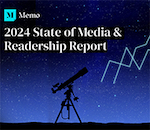 |
Axel Springer signs an agreement with OpenAI that will result in the publisher being compensated for the use of its content in ChatGPT and OpenAI’s artificial intelligence tools. The deal requires that ChatGPT’s answers to user queries attribute any material sourced from such Axel Springer platforms as Politico and Business Insider, in addition to providing links to the full articles. It includes otherwise paid content, and also allows for the use of Axel Springer content in training of OpenAI’s large language models. “This partnership with Axel Springer will help provide people with new ways to access quality, real-time news content through our AI tools,” said OpenAI COO Brad Lightcap. “We are deeply committed to working with publishers and creators around the world and ensuring they benefit from advanced AI technology and new revenue models.”
 |
| Zach Seward |
The New York Times brings on Zach Seward as editorial director of AI initiatives. Seward comes to the Times from business news site Quartz, where he was a founding editor, subsequently serving as chief people officer, CEO and editor-in-chief. He was previously a reporter at the Wall Street Journal, where he built and led the paper’s first social media team. At the Times, Seward will work with newsroom management to guide the integration of AI into the paper’s operations, beginning with the establishment of principles for how it does and does not use generative AI. That work will include designing training programs for curious journalists and partnering with colleagues across the company to determine where to incorporate generative A.I. tools into its publishing tools and digital products. “One reason we’re excited to have Zach in this role is that he shares our firm belief that Times journalism will always be reported, written and edited by our expert journalists,” the Times said in the release announcing Seward’s hire.
 |
The Nation, which has been in print since 1865, is transitioning from a weekly to a monthly publication, starting in January. While the magazine has seen a 3.8 percent jump in subscriptions to nearly 91,000 this year, that is less than half the 187,000 subscribers it had in 2006. As part of the change, each issue will be bumped up from 48 to 84 pages. According to Nation publisher D.D. Guttenplan, the new format is partly a response to subscriber requests for “more of what we do in print at one time, and less often.” Nation president Bhaskar Sundara told the New York Times that the move should not be seen as “a steppingstone towards a digital-only future,” but as “a way to deliver a better print product to people, rather than to step away from print.”


 Trump Media & Technology Group today reported a $58.2M net loss on $4.1M in 2023 revenues, a disclosure that drove its stock price down 22.6 percent to $47.96.
Trump Media & Technology Group today reported a $58.2M net loss on $4.1M in 2023 revenues, a disclosure that drove its stock price down 22.6 percent to $47.96. Barry Pollack, an attorney at Wall Street’s Harris St. Laurent & Wechsler, has registered Julian Assange as a client with the Justice Dept. “out of an abundance of caution.”
Barry Pollack, an attorney at Wall Street’s Harris St. Laurent & Wechsler, has registered Julian Assange as a client with the Justice Dept. “out of an abundance of caution.” Paramount Global to slash 800 jobs in what chief executive Bob Bakish calls part of an effort to “return the company to earnings growth"... Rolling Stone editor-in-chief Noah Shachtman is exiting at the end of the month due to disagreements with chief executive Gus Wenner over the direction the magazine is taking... The New York Times broke the $1 billion barrier in annual revenue from digital subscriptions in 2023... Press Forward is investing more than $500 million to strengthen local newsrooms.
Paramount Global to slash 800 jobs in what chief executive Bob Bakish calls part of an effort to “return the company to earnings growth"... Rolling Stone editor-in-chief Noah Shachtman is exiting at the end of the month due to disagreements with chief executive Gus Wenner over the direction the magazine is taking... The New York Times broke the $1 billion barrier in annual revenue from digital subscriptions in 2023... Press Forward is investing more than $500 million to strengthen local newsrooms. The majority of news articles are read within the first three days of publication, according to a recent report.
The majority of news articles are read within the first three days of publication, according to a recent report. The Los Angeles Times gives pink slips to 115 people or 20 percent of its newsroom staff... TIME is also laying off about 30 employees, which is approximately 15 percent of its editorial staff... The Baltimore Banner, which was launched by Stewart Bainum in 2022 after he failed to buy the Baltimore Sun, added 500 subscribers per day in the three days following Sinclair Broadcast Group's deal to purchase the Sun.
The Los Angeles Times gives pink slips to 115 people or 20 percent of its newsroom staff... TIME is also laying off about 30 employees, which is approximately 15 percent of its editorial staff... The Baltimore Banner, which was launched by Stewart Bainum in 2022 after he failed to buy the Baltimore Sun, added 500 subscribers per day in the three days following Sinclair Broadcast Group's deal to purchase the Sun.


 Have a comment? Send it to
Have a comment? Send it to 
No comments have been submitted for this story yet.